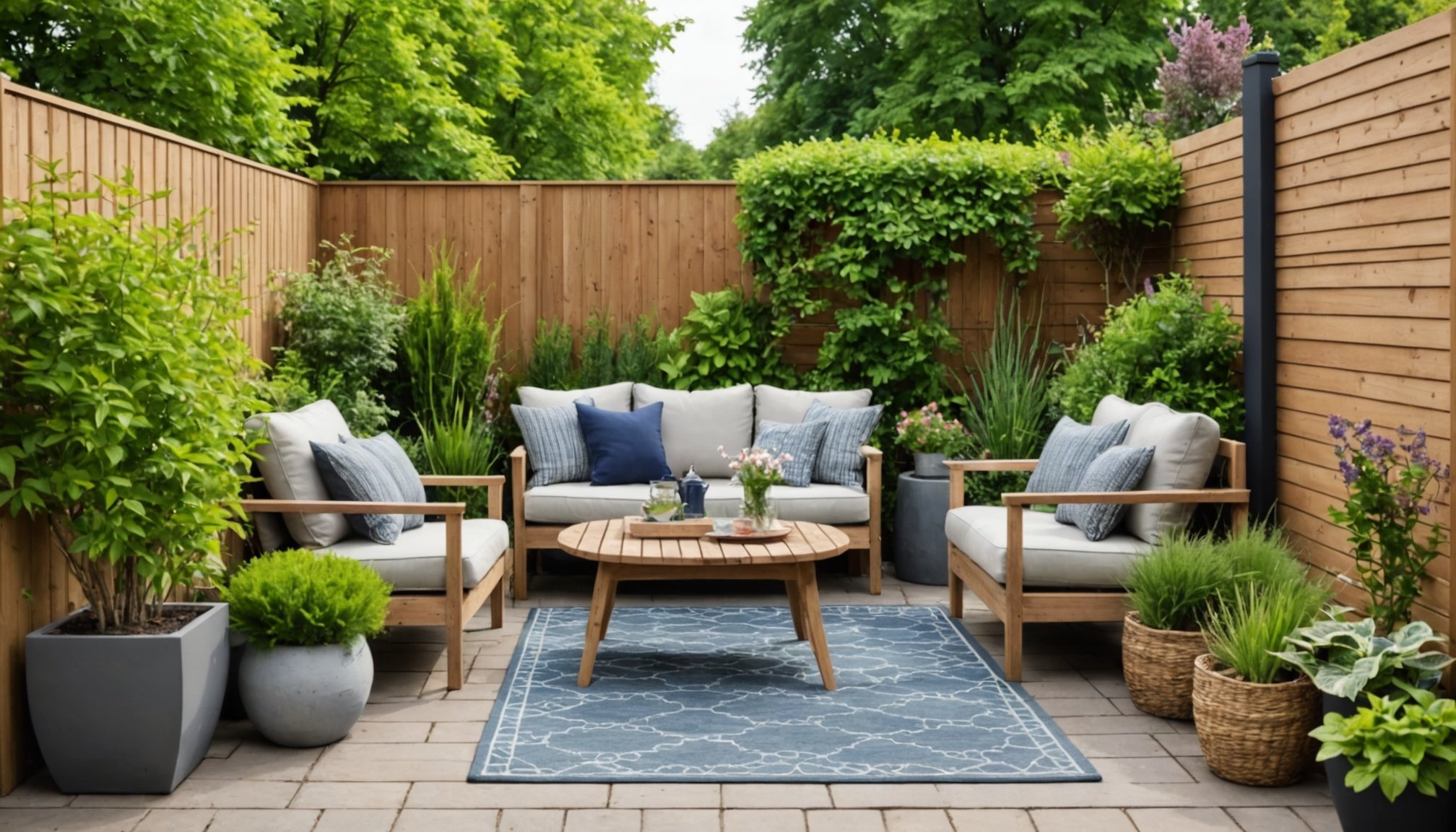Emerging Garden Trends for 2024
As we look forward to 2024, garden trends are evolving to emphasize sustainability, personal expression, and innovation. One key trend reshaping outdoor spaces is the rise of naturalistic landscapes. These designs often incorporate native plants and organic shapes, creating gardens that blend seamlessly with their environment. For example, using wildflowers or grasses native to your region can enhance local biodiversity and require less maintenance.
In addition, garden aficionados are drawing outdoor design inspiration from vertical gardens. Ideal for compact or urban spaces, these installations make efficient use of vertical areas, allowing for artistic freedom and practicality. Whether it’s a living wall of herbs on a balcony or a striking vertical flower display, the possibilities are vast and adjustable to varying styles.
Also to see : Mastering the Art of Propagating Rare UK Native Plants: Effective Techniques for Success
Personalization is becoming paramount as homeowners seek to capture their unique styles in outdoor settings. Mixing and matching various elements—such as furniture, plants, and pathways—encourages an imaginative and personal touch. Whether your taste is minimalist, bohemian, or traditional, reflecting your identity through innovative garden design can turn any outdoor space into a sanctuary. Make 2024 the year you begin cultivating a garden that is not only beautiful but also a true extension of yourself.
Plant Selection for Contemporary Gardens
Embarking on your 2024 gardening journey necessitates careful consideration of plant trends. Picking the right varieties is crucial for crafting contemporary gardens that resonate with the theme of the year. Emphasizing sustainable gardening, many experts advocate for the inclusion of native and drought-resistant plants. These not only ensure minimal maintenance but also enhance biodiversity—which is vital in sustaining local ecosystems.
In the same genre : Unlocking the Secret: The Perfect Soil pH for Thriving Roses in the UK
Having a diverse plant mix renders your garden resilient against pests and diseases, while using local flora often provides better adaptation to your garden’s specific environmental conditions.
Incorporate trendy varieties like pollinator-friendly perennials and vibrant ornamental grasses. Such selections act as visual anchors, adding texture and movement. Fragrant herbs such as lavender or rosemary can also serve as both functional and beautiful additions, supporting culinary endeavours and attracting beneficial insects.
When choosing plants, opt for species that require low maintenance—symbolised by lower water needs and Hardiness Zone suitability. This approach promotes sustainable gardening as it aligns with environmentally responsible practices, lowering resource consumption across seasons, resulting in beautiful yet efficient garden designs. By understanding these plant dynamics, gardeners can successfully cultivate thriving outdoor spaces that meet contemporary aesthetic standards.
Landscaping Techniques and Styles
Exploring the landscaping trends for 2024 unveils various styles that blend innovative design with personal expression. A focal point is naturalistic landscaping, which utilises native plants to harmonise with local ecosystems. This approach not only fosters biodiversity but also requires less maintenance, making it an appealing choice for gardeners seeking harmony with nature.
Natural shapes and organic layouts create an immersive experience, drawing inspiration from naturally occurring environments.
In parallel, vertical gardens are redefining how small spaces are utilised. By growing plants upward, these solutions maximise limited areas, providing practical benefits while maintaining aesthetic appeal. Such gardens can be tailored to suit any style, from sleek modern designs to lush, abundant textures.
Creating functional outdoor spaces goes beyond aesthetics, aiming to craft environments ideal for relaxation and social gatherings. By integrating multipurpose features like seating areas or fire pits, gardens become extensions of indoor living spaces. This trend encourages homeowners to consider both form and function, enhancing outdoor aesthetics while cultivating inviting, adaptable habitats.
In essence, the landscaping revolution of 2024 encourages a balance between beauty, functionality, and environmental consciousness, crafting outdoor spaces that resonate with personal and ecological values.
Outdoor Furniture and Décor
In 2024, outdoor living spaces continue to evolve, driven by innovative garden furniture ideas. A pivotal trend is the use of sustainable material choices for eco-conscious consumers. Furniture crafted from recycled plastics, responsibly-sourced wood, and bamboo offers durability while preserving ecological balance. These materials not only contribute to environmental health but also endure diverse weather conditions, ensuring longevity.
Another fascinating trend is modular furniture solutions, providing versatility for adaptable outdoor spaces. Homeowners can rearrange or customise these pieces to fit various settings, be it a small balcony or a sprawling patio. This flexibility caters to changing tastes, needs, and seasonal aesthetics, offering a dynamic approach to outdoor design.
Creating a cozy outdoor ambiance is essential for fostering inviting environments. Elements such as weather-resistant cushions, ambient lighting, and textured throws enhance comfort and warmth. Incorporating decorative accents like lanterns or potted plants can transform simple spaces into serene retreats. These touches not only add personality but also harmonise with the user’s individual style preferences, offering an ideal setting for relaxation or social gatherings.
Adopting these evolving trends helps construct engaging and sustainable outdoor living spaces, tailored for comfort and functionality.
Sustainable Practices in Gardening
In 2024, the focus on sustainable gardening practices is stronger than ever. Integrating permaculture principles into your garden design promotes harmony with nature by mimicking natural ecosystems. This approach not only improves soil health and reduces waste but also encourages biodiversity, making it an essential component of eco-friendly gardening.
Composting is another vital practice that enhances soil fertility while reducing household waste. It recycles organic matter, turning kitchen scraps and yard debris into nutrient-rich food for plants. Organic gardening methods, such as avoiding chemical pesticides and fertilisers, nurture plant health naturally, making gardens safer for families and wildlife.
Water conservation techniques hold paramount importance in today’s landscapes. To achieve this, consider installing rain barrels or creating rain gardens to capture and utilise runoff effectively. Drip irrigation systems also play a crucial role in minimising water usage by delivering moisture directly to plant roots.
Implementing these sustainable gardening practices not only reduces environmental impact but also crafts more resilient and enduring garden spaces. By adopting these methods, gardeners can contribute to a healthier planet while enjoying the beauty and bounty of their outdoor sanctuaries.
Technology Integration in Gardens
In 2024, smart gardens are at the forefront of innovation, with technology becoming an indispensable ally in modern horticulture. One of the most significant advancements is the development of smart irrigation systems. These can precisely control water usage, adjusting to weather conditions and soil moisture levels. This innovation not only conserves water but also ensures plants receive optimal hydration.
Further enhancing garden care are garden management apps. These tools simplify the monitoring and management of garden spaces. With features like plant identification, care tips, and scheduling reminders, they turn smartphones into personal gardening assistants. Such apps cater to both novice gardeners and seasoned horticulturists.
Another technological leap is the use of automation with IoT (Internet of Things). This includes smart lighting and temperature control, allowing gardeners to create ideal growing environments. Automation facilitates a seamless integration of devices, providing flexibility and enhancing overall garden aesthetics and functionality.
These technologies empower gardeners to transform their outdoor spaces into high-tech oases, promoting efficient and sustainable practices. By embracing these tools, one can ensure a thriving garden with less manual intervention, making gardening a more accessible hobby for all.
Actionable Tips for Transforming Your Garden
Transforming your garden into a modern masterpiece for 2024 requires an understanding of key garden transformation tips and DIY gardening strategies. Begin by identifying the latest trends that resonate with your space and personal style. Whether focusing on naturalistic landscapes or vertical gardens, align choices with your environmental conditions for best results.
Start with a step-by-step guide by assessing your garden’s potential. Sketch a layout reflecting natural shapes or modern minimalist lines, considering sections for relaxation and entertainment. Integrating trends like modular furniture or smart gardens can efficiently utilise space while adding a touch of innovation.
Creating a budget is crucial. Outline costs for plants, materials, and installation, allowing room for unforeseen expenses. Organising your plan through budgeting and planning recommendations will ensure a smooth transformation journey. DIY options can reduce costs: consider building structures or planting native flora yourself.
Expand your knowledge with abundant resources available online and in print. Explore books dedicated to modern gardening, or attend workshops for hands-on experience. Harness these resources for further learning and inspiration, enhancing your garden projects with creativity and practicality, making your outdoor haven a reflection of contemporary garden trends.











